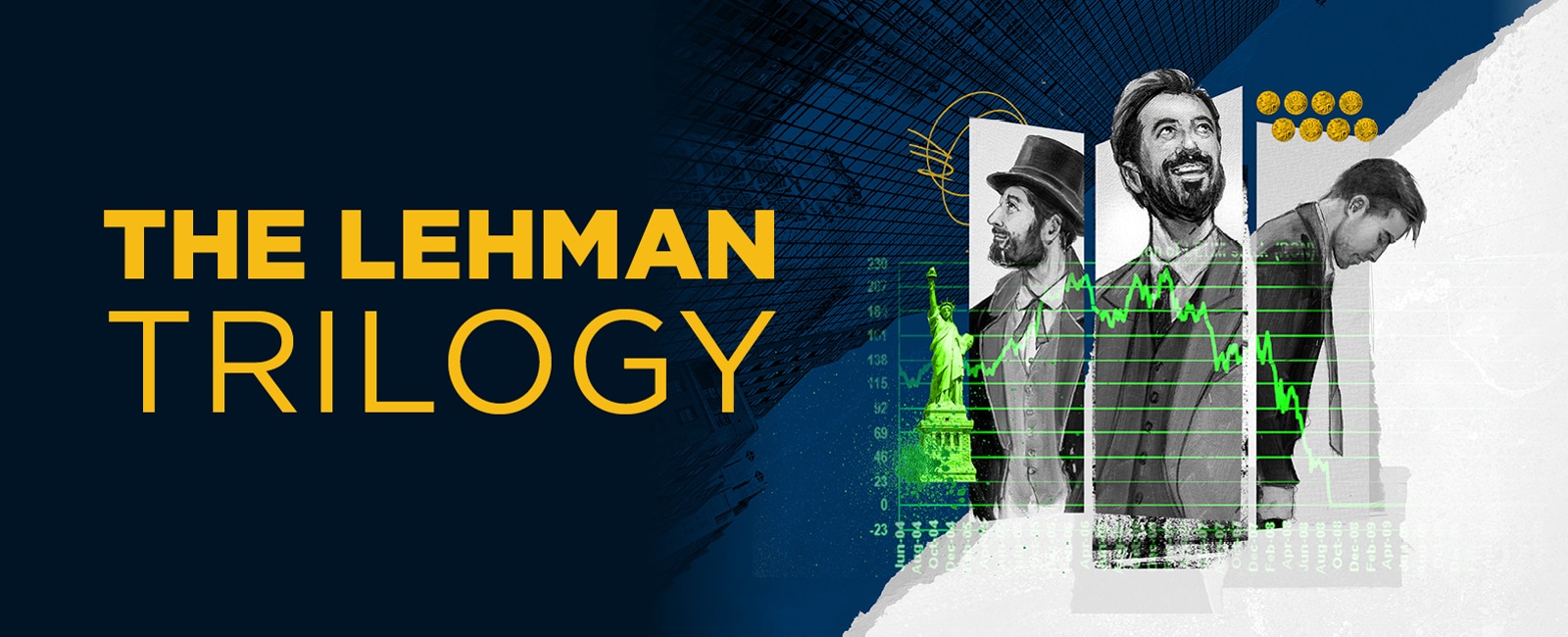DCPA NEWS CENTER
Enjoy the best stories and perspectives from the theatre world today.
Enjoy the best stories and perspectives from the theatre world today.

In 2008 the prominent Wall Street bank Lehman Brothers had 25,000 employees around the world. It carried $639 million in assets, and was the fourth largest investment bank in the United States — and one of the oldest.
But when its massive portfolio of mortgage-backed securities lost value and the nation’s over-inflated housing bubble burst, the company saw its stock price plummet — while other leading financial institutions also hit the rocks. By Sept. 15, Lehman had amassed $613 million in debt. With just $1 billion cash on hand and no private or government bail-out, the company shocked Wall Street by filing for bankruptcy.
You might assume a play titled The Lehman Trilogy, like numerous films about financial institutions gone bust during that recession-triggering autumn, focuses sharply on a seemingly invulnerable institution’s demise.
But the Tony Award drama by Ben Power and Stefano Massini, a hit in London, on Broadway and around the U.S., accomplishes something less predictable and more illuminating than a disaster timeline. It follows the rise of the Lehman firm from its mid-19th Century creation by a trio of three enterprising immigrant brothers, up to a kind of coda to its fateful collapse in 2008. And in doing so, it raises questions and concerns about the personal and societal damage wreaked by unbridled financial opportunism, without ethical or governmental guardrails to regulate it.
Based on a verse novel and play written in Italian by Massini, who was born and resides in Florence, The Lehman Trilogy has also been praised for its lean, effective style of theatrical storytelling over three acts. A trio of actors portray the three Lehman founders – Emanuel, Henry (Heyum) and Mayer – as well as transforming before one’s eyes into dozens of other characters, including some of the brothers’ descendants.
Spinning off actual events, the epic begins with the arrival of the Bavarian Jewish siblings in Montgomery, Alabama in 1844. In European countries, Jews had often been banned from owning land or joining unions. In the American South, the Lehmans began their business as a dry goods store. But they soon carved out a different role as middle men, purchasing large quantities of cotton from plantations (run on slave labor) and reselling it at a profit – spinning cotton into gold, as it were.
After the devastation of the Civil War, the play depicts Emanuel (a financial visionary, always looking for inventive ways to increase profits) moving the company to New York City’s burgeoning Wall Street district. There he embraces the lucrative business of making high-end loans, investing in such hot commodities as oil, iron and a new cross-country railroad system that forever changed the economy.
But over time, guided by the sons and grandsons of the founders, Lehman Brothers lends enormous sums for massive bundles of increasingly complex “derivatives” – as in mortgage-backed securities, which prove to be unsustainable as impractical loans and defaults multiply.
Yet as much as The Lehman Trilogy is a primer and timeline on the relentless march of American capitalism over several generations, it is also a study of how much is lost to a family with unbridled, single-minded profiteering. Gradually but surely, the Lehmans shed their Orthodox Jewish religious observances, their ties to the Old Country, and their familial trust in one another – as well as their concern for those who suffer from their moves in increasingly risky financial markets.
The Lehman Trilogy began in the theater as a five hour-plus verse work, performed (in Italian) at Teatro Piccolo in Milan. Intrigued, the renowned stage and film director Sam Mendes engaged British playwright Power to adapt the sprawling saga into a three-hour play. Mendes’ National Theatre staging premiered in London in 2018.
It was an immediate hit, hailed by the Guardian newspaper as an “astonishing” event “spanning 150 years,” and a tour de force for the shape-shifting actors.
When the work arrived on Broadway in 2021, critics were also enthusiastic. The Washington Post review by Peter Marks lauded the show as “a marvelous reckoning with [the Lehman] legacy, and a fascinating audit of a driven family’s psychic balance sheet.”
But The Lehman Trilogy also sparked some controversy. There have been complaints that it pays little attention to the Lehmans’ exploitation of slave labor in the Antebellum South, including the brothers’ own purchase of slaves. (In 2005 the company publicly acknowledged and apologized for its slavery ties.)
Also, charges that the play promulgates harmful caricatures of Jews have arisen. In the Jewish online magazine Tablet, Judith Miller wrote that it “contains subtle but pervasive intimations of the classic anti-Semitic tropes it ostensibly laments, with invocations of Jewishness — and Jewish power, and Jewish money…”
During 2008 financial crisis, and sadly to this day, bogus antisemitic conspiracy theories about Jews malevolently dominating and rigging the world economy have swirled online.
Defenders of the play note that Mendes is Jewish, and Massini, though gentile, has been an avid student of Jewish history and religion since his youth.
Also, the National Theatre engaged a rabbi as a script consultant. Orthodox Rabbi Daniel Epstein (who also consulted on a production of Tony Kushner’s Angels in America) advised on the Jewish rituals and Hebrew dialogue in the play, but also participated in lengthy discussions with the authors about how to represent the Lehmans’ Jewishness without stereotyping them.
“The Lehmans were Jews and they ran a bank,” Powers told the SoCal Jewish News. “There’s no getting away from that, but I don’t think the show deals in tropes. I think that their Jewishness and their financial acumen are two separate issues. I’m confident that the play is responsible in terms of the story it tells.”
The Denver Center Theatre Company production will allow the audience to judge for itself.
DETAILS
The Lehman Trilogy
May 3-June 2 • Kilstrom Theatre
Tickets
